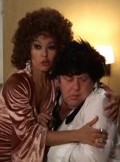Friday, November 3, 1976
THE RITZ. Written by Terrence McNally, adapted from his 1975 stage play. Music by Ken Thorne. Directed by Richard Lester. Running time: 91 minutes. Mature entertainment with the B.C. Classifier's warning: coarse and suggestive language.
ACCORDING TO FIGURES QUOTED with an almost evangelical fervour in director George Schlatter’s current [1976] feature Norman . . . Is that You?, one out of every six persons has a homosexual experience at some time in his life.
Perhaps. Right now, though, the operative figure at the Lougheed Mall Cinemas is two out of three.
At this moment, the feature attractions on two of the theatre's three screens are lavender comedies. (In the centre auditorium, Clint Eastwood's The Outlaw Josey Wales says very little about his sexual preferences as he busies himself gunning down everyone in sight.)
Norman . . . Is that You? and director Richard Lester’s The Ritz share more than their homophile humour. For one thing, both are based on recent New York stage plays.
For another, both feature homosexual characters as stereotypes: snicker, snicker, nudge, nudge limp-wrists. And, finally, the best performances in each movie are given by women.
Despite its reliance on comic stereotypes, The Ritz is cheerfully accepting of the reality of homosexuality in the the world. The more ambitious and entertaining of the two pictures, it is the latest from Lester, the director who brought The Beatles to the screen in the 1960s and The Three Musketeers in the 1970s.
The Ritz is the name of an opulent health spa based, in large measure, on New York's Continental Baths. Screenwriter Terence McNally’s 1975 Broadway play was a homosexual bedroom farce, the kind of production in which everyone suffers from a massive case of mistaken identity.
The rotund Jack Weston plays Gaetano Proclo, an innocent abroad in the rococo world of the spa. He is the husband of a Cleveland mafia don's daughter, and has been marked for death by the malevolent old man.
He flees to New York and, on the advice of a cab driver, decides that the Ritz would be the last place anybody would think to look for him.
“You ever been in a place like this before?” asks the desk clerk of his desperate-looking guest.
“Sure,” says Proclo. “We have a Jack LaLanne’s in Cleveland.”
Though The Ritz tends to flog the tired homosexual-as-fop stereotype, it does have two important things in its favour — skillful direction and Rita Moreno.
Moreno, who won an Oscar in 1961 for her work in West Side Story, recreates her Tony Award-winning role from the original Broadway production. The film's sharpest performer, she plays Googie Gomez, a fiery Puerto Rican singer who is trying to follow the Bette Midler route to stardom.
Her character mistakes Proclo for an important producer, and plays up to him throughout. He mistakes her for a transvestite, and is in constant retreat.
While Lester keeps things moving along at a fine clip, he makes no attempt to conceal the property's stage origins. It is obvious that what we're watching was designed for presentation in a confined space.
It would have been nice if the film was able to transcend its own smirk-inducing material. Too bad that The Ritz is aimed at people who think homosexual means pansy, and that pansies are funny. Hopefully, such appeal is limited.
The above is a restored version of a Province review by Michael Walsh originally published in 1976. For additional information on this archived material, please visit my FAQ.
Afterword: Sometimes described as history written on the run, journalism is often at a loss for words. The above review, written at a time when societal attitudes towards gay culture were in transition, reflects the fact that colloquial language was largely forbidden in newspaper reporting. Although Vancouver was home to a significant gay community — Pride Week celebrations were first held in 1973 — the so-called mainstream press was both strait-laced (and straight-jacketed) by its editorial gatekeepers. Linguistic neutrality was the rule, while colloquialisms (the word "gay" fell into that category) were frowned upon. Things got really awkward with a movie such as The Ritz, which was part of a social shift that most Province readers were assumed to be neither aware of nor interested in.
A decade later, when moviemakers turned their attention to the HIV/AIDS pandemic, the level of editorial interest seriously increased. In the mid-1990s, I was part of a newsroom committee that took on the task of revising the paper’s Style Guide, a 142-page handbook that every copy editor referred to for agreed-upon spellings and word meanings. Among the then-new entries was one that read “gay — now used primarily to denote homosexuals, so watch how you use it. Within the gay community, many use “gay” to mean male homosexuals and “lesbian” for women, but many also use gay for both sexes and we can too.”
Lestermania: The three mid-1970’s features in today’s Richard Lester package are Juggernaut (1974), Royal Flash (1975) and The Ritz (1976). They join the director’s five other features in the Reeling Back archive: The Three Musketeers (1973), The Four Musketeers (1974), Robin and Marian (1976), Superman II (1980) and Superman III (1983).
